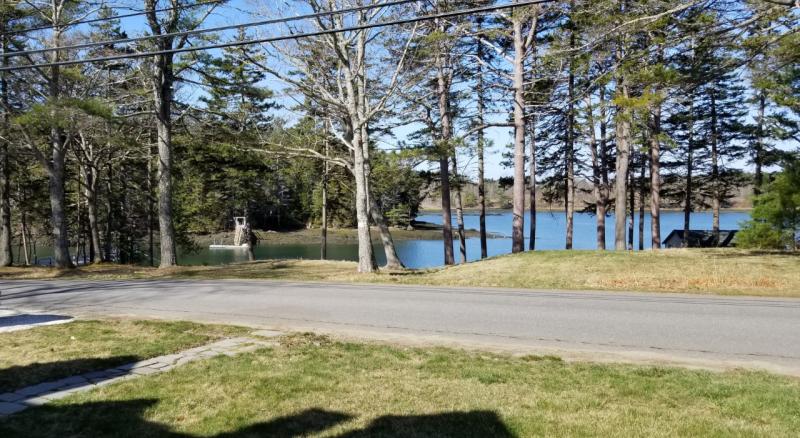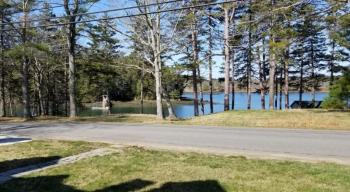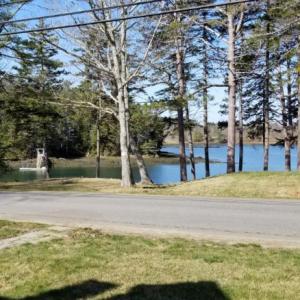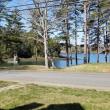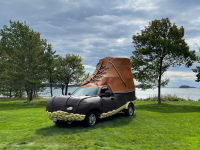Molinelli brings up Boothbay’s 2 court defeats
After two victories in Wiscasset District Court over the town of Boothbay, part-time resident Eugene Molinelli posed a simple question April 15 to selectmen. Why? In his statement during the board meeting’s public forum, Molinelli questioned the town’s leadership and decision-making on two code enforcement decisions dating back to 2014 and 2017. Both were eventually overturned in court.
“The town’s legal representation provided inferior legal advice and the courts found clear errors of law and abuse of discretion. This cost our family money, and hurt our reputation in the community, and for example the Boothbay Register, our community paper, had no reporting for our vindication in court. This is hurtful considering we are contributing members of the community,” he said.
A view easement of the Sheepscot River was the basis of the dispute between Boothbay and Molinelli and his wife Judith Molinelli who own a home at 66 Sawyers Island Road. The property includes a Sheepscot River view easement for 65 Sawyers Island Road. In 2014 and 2017, the Molinellis appealed two code enforcement rulings which were upheld by the board of appeals. This was followed by two appeals to Wiscasset District Court which overturned both Boothbay appeals board rulings.
In Eugene Molinelli’s statement to the select board in April, he hoped selectmen would rethink their actions in taking a similar case to court again. In the first case, Judge Daniel Billings heard the case regarding eight of 11 notice of violations upheld by the Boothbay Appeals Board. Billings ruled the Molinellis “had the stronger case” and the board of appeals made “an error (of) law and alternatively abused their discretion in determining the view easement and Molinellis’ intent to maintain it.”
In 2017, the Molinellis appealed a decision requiring them to seek a court-required permit for trimming the view easement. Code Enforcement Officer Art Dunlap approved a permit with three conditions. The Molinellis objected. During the appeals board hearing, only three of the five members attended. Two of the members sided with the Molinellis, but due to lacking a third vote, the appeal was denied.
The Molinellis appealed again, to Wiscasset Superior Court, and Billings, again, heard the case. Billings ruled in favor of the Molinellis in two of the three permit conditions. In his ruling, Billings ruled the court’s order requiring a permit didn’t provide the town “carte blanche to rewrite the previous court order.”
Eugene Molinelli believed the town followed “poor legal advice” and “tried to bully” him into compliance. “This is a pivotal court case for landowners. Not everyone can afford to take a case like this to court. I think the selectmen should re-think about their duty to the town, environment and landowners,” he said.
But Boothbay officials remain firm in their belief they followed municipal ordinances with the goal of protecting the environment. Town Manager Dan Bryer responded via email, the town used photographs of the property showing the vegetative maintenance hadn’t been done in accordance with the ordinance. “It was clear the property had reverted, and the town was of the opinion there were violations of the shoreland zone laws,” he wrote.
In the second case, the Molinellis presented multiple vegetative maintenance plans to Dunlap. In the last plan, Dunlap didn’t respond which led to the Molinellis believing Dunlap had approved it. But Dunlap hadn’t, and issued the Molinellis a notice of violation after the property was maintained. In district court, Billings ruled “the town tried to accomplish with the permit what they couldn’t in court “ and ruled in the Molinellis’ favor.
Despite two losses in court, Boothbay officials believed they followed the proper course. Bryer responded via email, “The town was in the opinion they were in violation of the shoreland zone laws.” Under the town ordinance, the view easement must be maintained on a yearly basis. Bryer, who served as code enforcement officer in 2014, reported the town had photographs which showed the property “had reverted” and were no longer “grandfathered” under the ordinance. In the 2017 matter, Bryer believed the town made the proper decision going to court even after two of the three board of appeals members sided with the Molinellis.
Bryer reasoned the board made “no decision” since the required three votes didn’t occur. He believed the town had a solid case in both district court appeals. “Our concerns are protecting the shoreline in both cases,” he wrote. Eugene Molinelli didn’t expect a response after he addressed the select board in April. “I wanted them to think about why this case went to court, not once, but twice,” he said. “It wasn’t to protect the shoreline or to uphold the law because the law was on our side. I wanted them to re-think the legal advice they received in these two cases.”
In light of the two court losses, would Boothbay do anything different? Bryer responded, “No.”
Event Date
Address
United States

